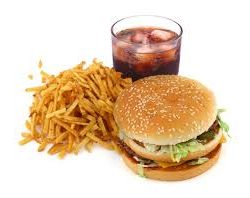
Can you go crazy for a couple of days on fatty foods without long term effects?
We’ve all tried to fool ourselves into thinking that we can eat poorly for a couple days, enjoying a couple of meals involving fatty foods – and that it won’t have any significant impact on our bodies.
Research is showing that this not the best way to keep trim. According to Matt Hulver, an associate professor of human nutrition, foods, and exercise in the Virginia Tech College of Agriculture and Life Sciences, after only five days of eating a high-fat diet, your body’s muscles change how they process nutrients. This may lead to long-term problems including weight-gain, obesity, and other health issues.
In the first study to be published that prove that this change happens so quickly, Matt Hulver and other Virginia Tech researchers recently published an article in the journal Obesity. Their published results seem to show that the manner in which muscle metabolizes nutrients is changed in just five days of high-fat feeding.
“This shows that our bodies are can respond dramatically to changes in diet in a shorter time frame than we have previously thought,” said Hulver, who is the head of the department and a Fralin Life Science Institute affiliate. “If you think about it, five days is a very short time. There are plenty of times when we all eat fatty foods for a few days, be it the holidays, vacations, or other celebrations. But this research shows that those high-fat diets can change a person’s normal metabolism in a very short timeframe.”
The study details their results showing that muscles’ ability to oxidize glucose after a meal is disrupted after five days of eating a high-fat diet, which could lead to the body’s inability to respond to insulin, a risk factor for the development of diabetes and other diseases.
The level of glucose in the blood rises when food is consumed. The body’s muscle is a major clearinghouse for this glucose. Your body’s muscle may break it down for energy, or it can store it for later use as fat. Since muscle makes up about 30 percent of our body weight and it is such an important site for glucose metabolism, if normal metabolism is altered, it can have dire consequences on the rest of the body and can lead to health issues.
To conduct the study, healthy college-age students ate a fat-laden diet that included sausage biscuits, macaroni and cheese, and food loaded with butter to increase the percentage of their daily fat intake. A normal diet is made up of about 30 percent fat. For this study, students had diets that were about 55 percent fat. Their overall caloric intake remained the same as it was prior to the high fat diet. To show how muscles metabolized glucose, muscle samples were collected. Although the study showed the manner in which the muscle metabolized glucose was altered, the students did not gain weight or have any signs of insulin resistance
Hulver and the team are now interested in examining how these short-term changes in the muscle can adversely affect the body in the long run and how quickly these deleterious changes in the muscle can be reversed once someone returns to a low-fat diet.
Source: Science Daily

